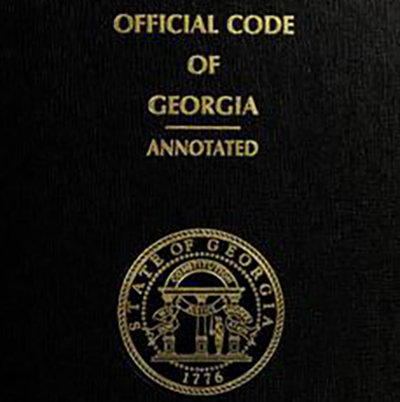After Supreme Court copyright fight, Georgia makes annotated legal code freely available

A bound volume of the Official Code of Georgia Annotated. Photo from the Georgia Code Revision Commission.
Georgia capped a yearslong legal fight over whether interpretations of its official state code are copyrightable, announcing Monday that the annotated legal code is now available online for free.
The chairman of Georgia’s House Judiciary Committee, Republican State Rep. Chuck Efstration, said interpretations of the legal code—which the U.S. Supreme Court ruled in 2020 are in the public domain—are now available online through LexisNexis.
Under its contract with a division of the legal publisher, the state had previously put the annotated legal code behind a paywall. The code included the text of all enforceable state laws, and annotations summarizing opinions of the judiciary and state attorney general.
“The law should be available for the public to access,” said Efstration who is also chairman of the Georgia Code Revision Commission. “I’m happy to report annotations are now available online along with the statute.”
Law.com has coverage of the announcement.
In 2015, the state of Georgia sued Public.Resource.org for copyright infringement in a federal court in Atlanta. The state sought an injunction against the nonprofit, run by public access activist Carl Malamud, which made annotations of the code freely available to the public by copying it and posting it online.
Though the state agreed that the laws are in the public domain, it argued that the interpretations of the meaning of the laws created by state officials were not.
But the Atlanta-based 11th U.S. Circuit Court of Appeals reversed and remanded the case back to the lower court. It ruled that because the Georgia Code Revision Commission was the author of the interpretations, they were public property. Therefore, the public could widely disseminate them without violating copyright law, the court found.
In 2020, the Supreme Court affirmed the appeals court ruling.
“If everything short of statutes and opinions were copyrightable, then states would be free to offer a whole range of premium legal works for those who can afford the extra benefit,” Chief Justice John Roberts wrote in the 5-4 decision. “A state could monetize its entire suite of legislative history. With today’s digital tools, states might even launch a subscription or pay-per-law service.”
At the time of the ruling, about 20 states had made similar claims regarding copyright protection of annotated codes, the New York Times reported.
See also:
ABAJournal.com: “In unusual lineup, SCOTUS rules annotations in Georgia state code can’t be copyrighted”
ABAJournal.com: “Appeals court rules that Georgia annotated code cannot be copyrighted”
ABAJournal.com: “Open Access: SCOTUS will consider whether publishers can copyright annotated state codes”



